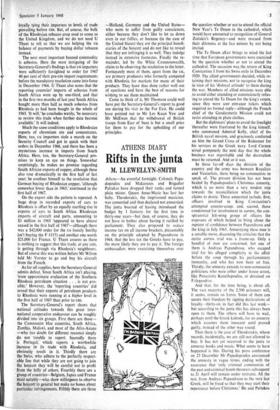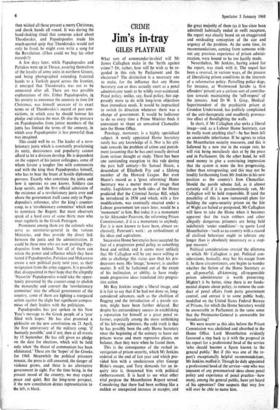Rifts in the junta
ATHENS DIARY M. LLEWELLYN-SMITH
AthensâAn eventful fortnight. Colonels Papa- dopoulos and Makarezos and Brigadier Pattakos have dropped their ranks and turned plain mister. Queen Anne-Marie has lost her baby. Theodorakis, the imprisoned musician, was amnestied and then declared not amnestied. The junta boasted of having introduced the budget by 1 January. for the first time in thirty-one yearsâbut then, of course, they do not have to bother about having it ratified by parliament. They also proposed to reduce income tax on all income brackets, presumably on the principle adopted by Papandreou in 1964, that the less tax the Greeks have to pay, the more likely they are to pay it. The foreign ambassadors were exercising themselves over the question whether or not to attend the official New Year's Te Deum in the cathedral, which would have amounted to recognition of General Zoitakis's Regencyâand were rescued from their dilemma at the last minute by not being invited.
The Te Deum affair brings to mind the last time that European governments were exercised by the question whether or not to attend the cathedral. The occasion was the return of King Constantine I from his Swiss exile in December 1920. The allied governments decided, while re- taining their missions, not to recognise the king in view of his 'disloyal attitude' to them during the war. Members of allied missions were able to avoid either attending or ostentatiously refus- ing to attend the Te Deum for the king's return, since they were sent entrance tickets which required no formal replyâalthough the French chief of the Gendarmerie Mission could not resist attending in plain clothes.
But the diplomats' plans to avoid the limelight thereafter were frustrated by the king himself.
who summoned Admiral Kelly, chief of . the British naval mission, and graciously conferred on him the Grand Cross of the Redeemer for his services to the Greek navy. Lord Curzon wired pompously the next day that the whole business was regrettable and the decoration must be returned. And so it was.
In those far-off days the division of the country and the army was between Royalists and Venizelists, there being no communists to speak of. The present division has not been healed by Papadopoulos's Christmas amnesty, which is no more than a very modest step towards the reconciliation which the junta claims to desire. Those amnestied include, first, officers involved in King Constantine's attempted counter-coup; and, second, those condemned for involvement in ASPIDA, the con- spiratorial left-wing group of officers the exposure of which helped to bring about the rupture of confidence between Papandreou and the king in July 1965. Amnestying these men is a sensible move, disarming the criticism that the entire ASPIDA trial was a frame-up. Only a handful of men are concerned, but one of them is Andreas Papandreou, who escaped trial for his alleged complicity in the affair before the coup through his parliamentary immunity, and who has now been set free. Thirdly, the amnesty extends to non-communist politicians who were either under house arrest, like Panayiotis Kanellopoulos, or detained on Folegandros.
And that, for the time being, is about all. The vast majority of the 2,500 prisoners will, it seems, remain on Leros. Some of them can secure their freedom by signing declarations of loyaltyâthirty-six in fact did this last weekâ but according to the junta this has always been open to them. The others will have to wait, perhaps until the Greek kalends, for an amnesty which assumes them innocent until proved guilty, instead of the other way round.
Then there is the case of Theodorakis, whose records, incidentally, we are still not allowed to buy. It has not yet occurred to the junta to amnesty books and music. What seems to have happened is this. During his press conference on 23 December Mr Papadopoulos announced the amnesty in vague terms, ending with the assurance that 'only criminal communists of the past and criminal bomb-throwers subsequent to 21 April will remain under restraint. All the rest, from Andreas Papandreou to the very last Greek, will be freed so that they may start their repentance before Christmas.' He and Pattakos then wished all those present a merry Christmas, and shook hands all round. It was during the hand-shaking ritual that someone asked about Theodorakis, and Papadopoulos made his much-quoted quip that Theodorakis would not only be freed, he might even write a song for the Revolution. (Then could we buy his other records?) A few days later, while Papadopoulos and Pattakos were up in Thrace, assuring themselves of the loyalty of army units in northern Greece, and being photographed extending fraternal hands to a Turkish guard across the frontier, it emerged that Theodorakis was not to be amnestied after all. There are two possible explanations of this. Either Papadopoulos, in his anxiety to announce the amnesty in time for Christmas, was himself unaware of its exact terms or of Theodorakis's record of past con- victions, in which case he should honour his pledge and release the man. Or else the pressure on Papadopoulos from junior members of the junta has limited the terms of the amnesty, ih which case Papadopoulos is less powerful than was imagined.
This could well be so. The leader, of a revo- lutionary junta which is constantly proclaiming its unity, decisiveness and popularity cannot afford to let a division develop. He is dependent on the support of his junior colleagues, some of whom favour a tougher line with communists and with the king than Papadopoulos himself, who has to bear the brunt of hostile diplomatic pressure. Exactly who constitute the junta and how it operates no one knows. Soldiers can keep secrets, and the first official admission of the existence of a revolutionary junta over and above the government itself came only in Papa- dopoulos's reference, after the king's counter- coup, to a `revolutionary committee' which met to nominate the Regent. But most observers speak of a hard core of some thirty men who meet regularly in the Greek Pentagon.
Prominent among them-are the colonels who serve as secretaries-general in the various Ministries, and thus provide the direct link between the junta and the administration. It could be these men who are now pushing Papa- dopoulos from behind. Not all of them can retain the power and influence which they have tasted if Papadopoulos, Pattakos and Makarezos create a new political party next year, as their resignation froin the army suggests. It is possible that, disappointed in their hope that the allegedly 'Nasserite' Papadopoulos would take the oppor- tunity presented by the counter-coup to abolish the monarchy and convert the 'revolutionary committee' into the official government of the country, some of them are fighting a rearguard action against the slight but significant compro- mises of their leaders with the politicians.
Papadopoulos has just spoken in his New Year's message to the Greek people of a `year filled with hopes.' He has also promised a plebiscite on the new constitution on 21 April, the first anniversary of the military coup, If humanly possible,' and if not, then at all events by 15 September. He has still given no pledge on the date for elections, which will be held only when `the threat of communism has been eliminated.' These are the 'hopes' of the Greeks for 1968. Meanwhile the political prisoners remain, the press is still censored, the danger of violence grows, and there is no alternative government in sight. For the time being, in the present mood of the country, we may expect peace and quiet. But the long-term prospect, if the new constitution denies representation to the left, is bleak.



































 Previous page
Previous page